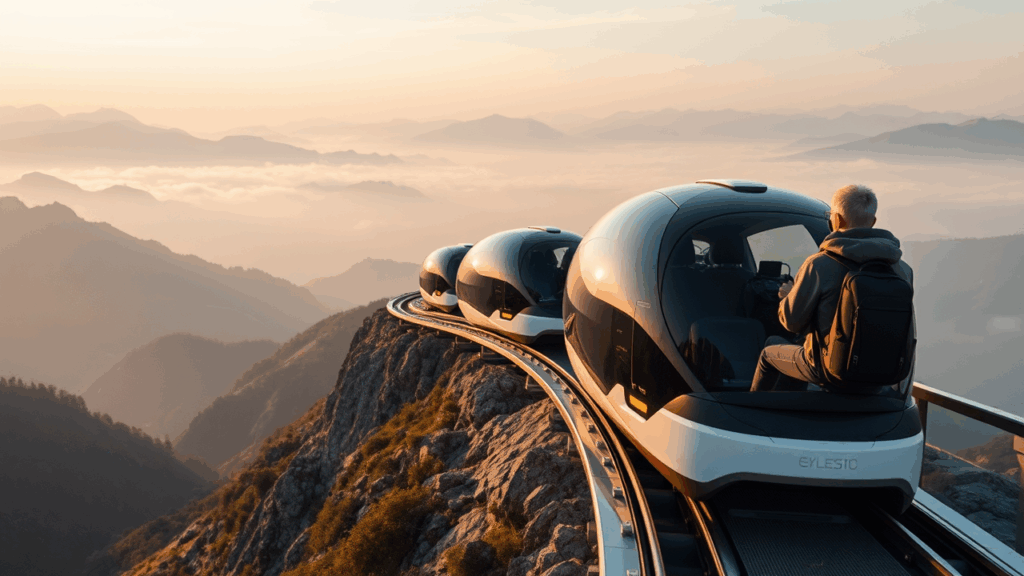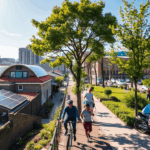# Future Mobility and the Rise of Ephemeral Escapes: Exploring New Horizons Beyond the City
## Embracing a New Era of Mobility
Imagine a world where spontaneous getaways are no longer confined by traditional transportation limitations. Future mobility concepts are paving the way for ephemeral escapes—those fleeting, unforgettable adventures that happen outside the hustle and bustle of urban centers. As technology advances and infrastructure evolves, we’re on the cusp of a travel revolution that will connect us to pristine landscapes, remote destinations, and hidden gems in ways previously unimaginable.
Devin Liddell, a renowned futurist at Teague and a specialist in mobility, emphasizes the crucial role of infrastructure and geography in shaping these new travel possibilities. He explains, “The complexities of moving people around are dependent on myriad factors, with infrastructure and geography key among them.” This insight highlights how innovations in transportation can transform even sparse, undeveloped areas into accessible, vibrant travel spots.
## How Future Mobility Will Transform Travel
One of the most exciting aspects of upcoming mobility concepts is their potential to democratize travel. Currently, nearly a quarter of travelers report that sustainable travel options feel too expensive, according to Trip.com’s 2022 Group Sustainable Travel Consumer Report. This perception limits many people’s ability to explore eco-friendly destinations or engage in responsible tourism.
However, with continued advancements in transportation technology—like autonomous vehicles, electric air taxis, and modular travel pods—cost-effective and flexible travel options will become more widespread. These innovations will make sustainable and adventurous travel more accessible to a broader audience, breaking down barriers of cost and infrastructure.
Moreover, ephemeral escapes will flourish in locations with limited existing infrastructure. Think of remote coastal areas, mountain retreats, or untouched wilderness regions—areas that have traditionally been difficult to access due to geographical obstacles or lack of roads. Future mobility solutions could include on-demand transportation services, portable infrastructure, or even drone-based delivery and transit systems, facilitating easy and eco-friendly access to these pristine environments.
## Infrastructure and Technology Creating New Travel Experiences
The development of adaptable, sustainable infrastructure will be crucial in supporting these transient adventures. For example, portable solar-powered charging stations, temporary roads, or inflatable shelters could be deployed quickly in remote areas to support visitors without permanent development.
In addition, technological advancements like AI-driven navigation and personalized travel planning will help adventurers explore beyond conventional routes safely and efficiently. Imagine planning a spontaneous mountain hike or a desert camping trip with just a smartphone app that communicates directly with autonomous vehicles or drone deliveries—making off-grid experiences seamless and stress-free.
## Why Ephemeral Escapes Matter for the Future
Ephemeral escapes are more than just fleeting vacations; they represent a shift toward sustainable, responsible, and inclusive travel. As more people gain access to these experiences, we can foster a deeper appreciation for nature and cultural diversity, all while reducing our environmental footprint.
Looking ahead to 2040, experts believe that greater flexibility and connectivity in transportation will empower everyone—from urban dwellers seeking quick escapes to remote communities looking to share their heritage. This democratization will allow more travelers to experience the beauty of untouched landscapes responsibly and sustainably.
## Final Thoughts
The future of mobility is truly exciting. With innovative concepts and technological breakthroughs, we’re heading toward a world where travel is more spontaneous, sustainable, and accessible than ever before. These ephemeral escapes will not only satisfy our craving for adventure but also promote a more responsible interaction with our planet.
As travelers, our challenge—and opportunity—is to embrace these emerging possibilities, support sustainable infrastructure development, and explore the world beyond our usual horizons. The journey toward a more connected, eco-friendly, and inclusive travel future starts now.
—
Author: Jasper Rahman
Category: Travel & Transportation


